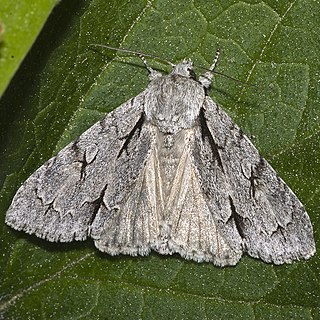
The grey dagger is a moth of the family Noctuidae.

Alsophila aescularia, the March moth, is a species of moth of the family Geometridae. It is found throughout Europe and can be a pest of fruit trees.

Lomographa temerata, the clouded silver, is a moth of the family Geometridae. The species is found in Asia and Europe and was first described by Michael Denis and Ignaz Schiffermüller in 1775.
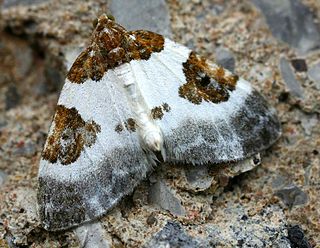
Plemyria rubiginata, the blue-bordered carpet, is a moth of the family Geometridae found in Europe and across the Palearctic. The moth was first described by the Austrian lepidopterists Michael Denis and Ignaz Schiffermüller in 1775.
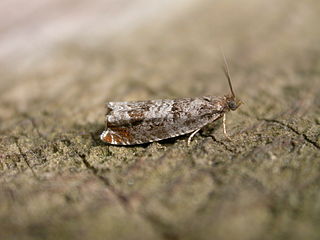
Ancylis achatana is a moth of the family Tortricidae. It is found from central and southern Europe including the United Kingdom and Ireland, east to the Baltic region, Asia Minor, Ukraine and Russia to the southern part of Trans-Ural.
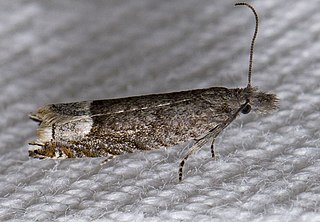
Ancylis tineana is a moth of the family Tortricidae. It is found from southern Sweden to Asia Minor and from the Trans-Caucasus to Siberia and the southern part of eastern Russia. It is also present in North America.

Coleophora anatipennella is a moth of the case-bearer family (Coleophoridae).
Stigmella oxyacanthella is a moth of the family Nepticulidae, found in Europe. The larvae are leaf miners feeding inside the leaves of trees and shrubs.

The banded apple pigmy is a moth of the family Nepticulidae. It is found almost all of Europe, except Iceland and Norway.

Ectoedemia atricollis is a moth of the family Nepticulidae. It is found from Scandinavia to the Pyrenees, Italy, and Romania and from Ireland to Ukraine and the Volga and Ural regions of Russia. It has also been recorded from Tajikistan, where it is probably an introduced species.
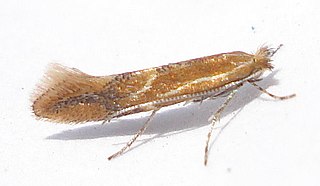
The hawthorn red midget moth is a moth of the family Gracillariidae. It is found in all of Europe.

The apple blotch leafminer is a moth of the family Gracillariidae. It is known from Canada the United States.
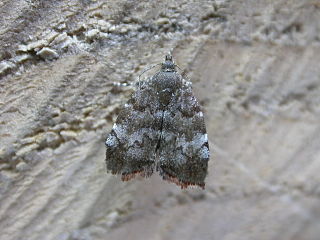
Choreutis pariana, the apple-and-thorn skeletonizer or apple leaf skeletonizer, is a moth of the family Choreutidae. The moth was first described by the Swedish entomologist Carl Alexander Clerck in 1759. It is native to Eurasia and was introduced to New England, USA in 1917.
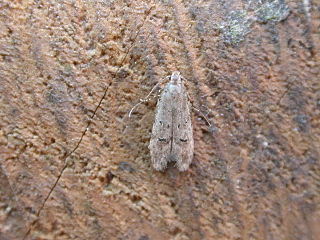
Teleiodes vulgella is a moth of the family Gelechiidae. It is known from most of Europe, east to the southern Ural and the Volga region.
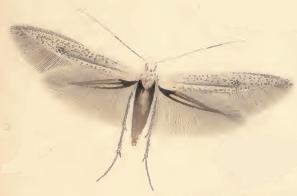
The fruit tree case moth is a moth of the family Coleophoridae, found in western Europe.

Coleophora prunifoliae is a moth of the family Coleophoridae. It is found from Scandinavia to the Pyrenees, Italy and Romania and from Great Britain to southern Russia.

Blastodacna hellerella is a moth in the family Elachistidae. It is found in most of Europe except the north. In the east, the range extends to the Caucasus.
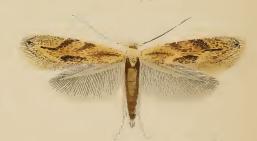
Bucculatrix bechsteinella is a moth of the family Bucculatricidae. It was described by Johann Matthäus Bechstein and Georg Ludwig Scharfenberg in 1805. It is found in most of Europe, except Greece and Bulgaria.
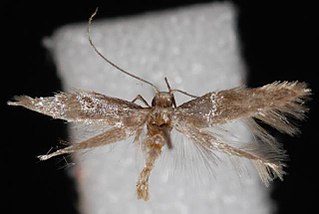
Coptotriche malifoliella is a moth of the family Tischeriidae. It was described by James Brackenridge Clemens in 1860. It is found in North America in Ontario, the District of Columbia, Indiana, Kentucky, Massachusetts, New Jersey, New York, Ohio, Pennsylvania and Texas.
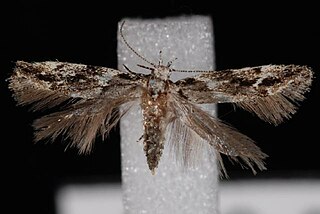
Recurvaria nanella, the lesser bud moth, is a moth of the family Gelechiidae. It is widely distributed in Europe and is also found in Turkey, the Near East, North Africa, the Caucasus, Transcaucasia, Kazakhstan and south-eastern Siberia. It is also found in North America, where it is probably introduced.















